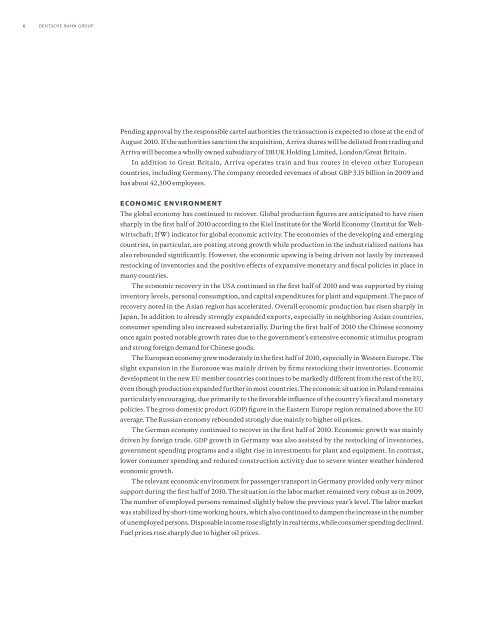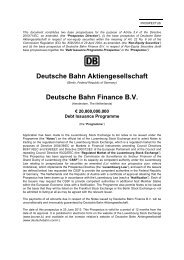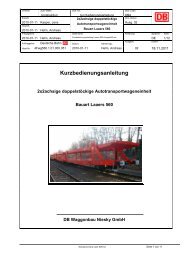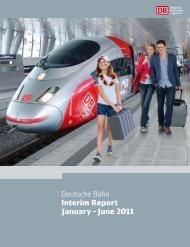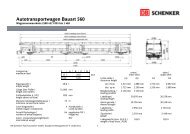Create successful ePaper yourself
Turn your PDF publications into a flip-book with our unique Google optimized e-Paper software.
6<br />
<strong>Deutsche</strong> bahn group<br />
Pending approval by the responsible cartel authorities the transaction is expected to close at the end of<br />
August 2010. If the authorities sanction the acquisition, Arriva shares will be delisted from trading and<br />
Arriva will become a wholly owned subsidiary of DB UK Holding Limited, London /Great Britain.<br />
In addition to Great Britain, Arriva operates train and bus routes in eleven other European<br />
countries, including Germany. The company recorded revenues of about GBP 3.15 billion in 2009 and<br />
has about 42,300 employees.<br />
ECONOMIC ENVIRONMENT<br />
The global economy has continued to recover. Global production figures are anticipated to have risen<br />
sharply in the first half of 2010 according to the Kiel Institute for the World Economy (Institut for Weltwirtschaft;<br />
IfW) indicator for global economic activity. The economies of the developing and emerging<br />
countries, in particular, are posting strong growth while production in the industrialized nations has<br />
also rebounded significantly. However, the economic upswing is being driven not lastly by increased<br />
restocking of inventories and the positive effects of expansive monetary and fiscal policies in place in<br />
many countries.<br />
The economic recovery in the USA continued in the first half of 2010 and was supported by rising<br />
inventory levels, personal consumption, and capital expenditures for plant and equipment. The pace of<br />
recovery noted in the Asian region has accelerated. Overall economic production has risen sharply in<br />
Japan. In addition to already strongly expanded exports, especially in neighboring Asian countries,<br />
consumer spending also increased substantially. During the first half of 2010 the Chinese economy<br />
once again posted notable growth rates due to the government’s extensive economic stimulus program<br />
and strong foreign demand for Chinese goods.<br />
The European economy grew moderately in the first half of 2010, especially in Western Europe. The<br />
slight expansion in the Eurozone was mainly driven by firms restocking their inventories. Economic<br />
development in the new EU member countries continues to be markedly different from the rest of the EU,<br />
even though production expanded further in most countries. The economic situation in Poland remains<br />
particularly encouraging, due primarily to the favorable influence of the country’s fiscal and monetary<br />
policies. The gross domestic product (GDP) figure in the Eastern Europe region remained above the EU<br />
average. The Russian economy rebounded strongly due mainly to higher oil prices.<br />
The German economy continued to recover in the first half of 2010. Economic growth was mainly<br />
driven by foreign trade. GDP growth in Germany was also assisted by the restocking of inventories,<br />
government spending programs and a slight rise in investments for plant and equipment. In contrast,<br />
lower consumer spending and reduced construction activity due to severe winter weather hindered<br />
economic growth.<br />
The relevant economic environment for passenger transport in Germany provided only very minor<br />
support during the first half of 2010. The situation in the labor market remained very robust as in 2009.<br />
The number of employed persons remained slightly below the previous year’s level. The labor market<br />
was stabilized by short-time working hours, which also continued to dampen the increase in the number<br />
of unemployed persons. Disposable income rose slightly in real terms, while consumer spending declined.<br />
Fuel prices rose sharply due to higher oil prices.


